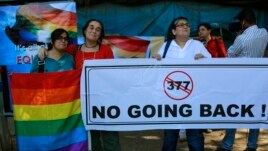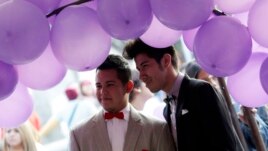07 February, 2014
From VOA Learning English, this is As It Is.
Welcome back. I'm Caty Weaver.
Today on the program, we report on how the wedding industry is serving the increasing number of gay people who are getting married.
"I think it's great that now we have this opportunity and it's great to see so many vendors here who support the community."
But first, we go to India, where gay people and their supporters are looking for political support.
"Long term we have to think political."
Homosexuals in India look for political support and wedding planners and others serve the growing market of gay couples who are getting married today on As It Is.
Listen carefully, and before you know it, you will have improved your American English by listening to As It Is, here on VOA.
A Debate Grows About Gay Rights in India
The Supreme Court in India recently reestablished an old law that banned sexual relations between same sex couples. Many say the law has led to discussion about homosexuality -- a subject that has long been ignored in the country. India's gay community is reacting to the debate with a rights campaign.
Christopher Cruise reports.
Shaleen Rakesh is a 43-year-old gay rights activist in New Delhi. During his youth, he says, people did not even comment about homosexuality. And he says it definitely was not discussed and debated.
"I used to really wonder if there are any other gay people in the country except for me, because I never met one until much later, when I was in college. Really it was a suffocating silence around us."
That silence was broken about ten years ago, when activists began a legal battle to cancel an old law that banned gay sex. They succeeded in 2009.
But last month, India's highest court re-established the law. Now, Mr. Rakesh and others in the lesbian, gay, bisexual and transgender community are at risk of legal action.
Activists appealed the decision, but the court rejected the appeal.

Indian activists in Mumbai protest a law banning same-sex marriage.
Rights activists say they will not surrender. They now are seeking political support for their cause, an action the Supreme Court suggested. It said changing laws is the job of the legislature.
Gender rights activist Anjali Gopalan is with the Naz Foundation. She says working with parliament to change the law may be the only path open to supporters.
There are many conservatives in India's parliament, including members of the Bharatiya Janata Party. Public opinion studies say the group may lead India's next government.
So far, the ruling Congress Party has been the main political supporter of gay rights. For example, it proposed that the Supreme Court reexamine its decision to renew the anti-gay law. However, the Congress Party is expected to lose some power in the next government.
Anti-gay political positions are not surprising in India. There is not wide social acceptance of homosexuality. Christian and Muslim groups may have led the fight for a renewal of the gay sex ban. Even liberal groups in India mostly reject the idea of gays openly living together.
However there has been major change in the past ten years. The silence that troubled people like Shaleen Rakesh is over. Growing numbers of homosexuals in India no longer hide their sexual nature.
Magazines for the gay community -- like "Bombay Dost" -- are no longer released in secret. The main media groups are also supportive of the subject. And gay demonstrations have increased in number and size. Now, non-homosexual students and young professionals can be found at such events, supporting members of the gay community.
Thirty-five-year-old reporter Aditi Sengupta is among these supporters. She says the issue is not gay rights, but human rights.
"What we need to do right now is take this as a movement for civil liberties. Because today if we call ourselves a democracy we have to include everybody, irrespective of sexual orientation, creed, color, religion, everything. It is not just about them -- if you look at the larger picture it is about each one of us."
Activists say ending the newly-reestablished law is the goal of the movement. But they say they will also try to begin a social movement that appeals to all Indians to change their minds about homosexuals.
I'm Christopher Cruise.
Now we return to Caty Weaver for a report about how the wedding industry is serving the increasing number of gay couples who are getting married under new state laws.
Thanks, Chris.
Wedding Industry Serves Growing Gay Market

The wedding industry is answering the increase in same-sex marriage.
And photographers, food preparers, entertainers and others in the wedding industry want their business. The number of large industry shows, called "expos," that target this new market is also increasing.
Love was in the air at one such expo in Baltimore, Maryland recently. The Lesbian, Gay, Bisexual and Transgender Wedding Expo included more than 30 businesses selling everything from wedding clothes to wine to food.
Long-time couple Michael Sofield and Jamie Barnes came to the expo from New Jersey, where same-sex marriage is legal. Mr. Sofield says they will marry in Maryland this May.
"I think it's great that now we have this opportunity and it's great to see so many vendors here who support the community."
Marianne Puechl and her partner began organizing these expos in 2003. That was before same-sex marriage was legal anywhere in the country. She says it is often difficult for gays and lesbians to attend wedding expos designed for heterosexuals. But they do not have those problems at her expos.
"They're just immediately understood to be the brides or the grooms and they go from there and they launch directly into the joy and the excitement of planning their day."
Cristina Dimperio from Maryland is getting married next year. She says she liked going to an event where she felt at ease.
"It's definitely a good thing. We've been trying to do this for a long time and now that we can actually do it, it feels great."
Her mother, Catia Dimperio, is excited for Cristina and her daughter's girlfriend of six years.
"She's 26 and we're all ready for her to get married."
Wayne Schwandt was at the expo to offer his services as a wedding officiant. He is a gay, married religious leader. He serves a Maryland church with a mainly gay gathering. Mr. Schwandt says he helps fills an emptiness, because many clergy won't perform a marriage ceremony for same-sex couples.
"I have been trying to focus more on marriage ceremonies for couples who are seeking to find an open and affirming pastor, which is still a rather rare breed in this country."
Bridal store owner Betsy Robinson says she has been selling more wedding dresses to lesbian brides.
"It used to be, found it internesting, that even if they were shopping with the mother, the mom wouldn't say my daughter is marrying another woman, whereas today that's very, very common."
Joseph Smith and his husband have a wedding invitation business. He says many He sayHe business owners are not sure how to communicate with the gay and lesbian community.
"Because we're part of it, people feel more comfortable working with us."
Expo organizer Marianne Puechl says the expos with the highest attendance are in states that do not permit same-sex marriage. She notes that many couples have other ceremonies to celebrate their love in states where laws do not permit them to be married.
And that's or program for today. I'm Caty Weaver. Thanks for joining us.